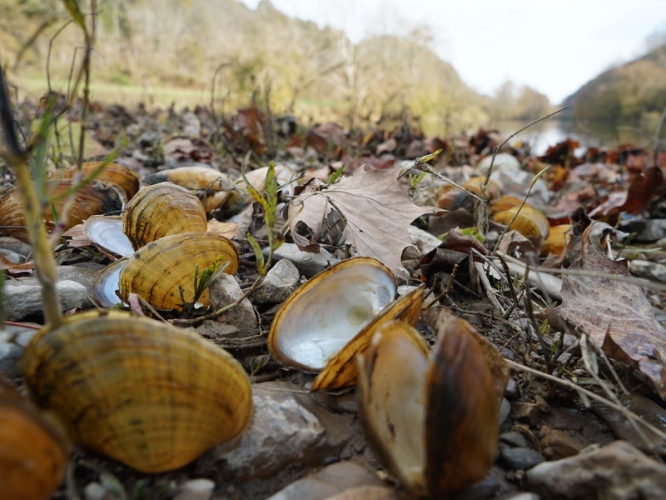
Biologists pile recently dead mussel shells on the edge of the Clinch River after documenting the species' number and type. The smell can get "real bad," says biologist Rose Agbalog
Nature's 'Brita Filter' Is Dying And Nobody Knows Why
Dec 6, 2019 at 10:00am
On "good" bad days, the shells lie open at the bottom of the river, shimmering in the refracted sunlight. Their insides, pearl white and picked clean of flesh, flicker against the dark riverbed like a beacon, alerting the world above to a problem below.
"That's what we look for in die-offs," says biologist Jordan Richard, standing knee-deep in the slow-flowing waters of the Clinch River in southwest Virginia. He points at a faint shape submerged about 10 feet upstream. "I can tell from here that's a pheasantshell, it's dead and it died recently. The algae development is really light."

The pheasantshell is a freshwater mussel, a less-edible version of its saltwater cousin that spends most of its inconspicuous life part-buried in riverbeds, blending in with the rocks and filtering the water around them.
In recent years, though, biologists and fishermen noticed something was wrong. On sections of the Clinch and other waterways in the Pacific Northwest and Midwest, dead mussels were turning up on shores and could be seen glinting from the river bottom. Surveys revealed more recently dead or dying mussels half-buried and rotting in still-clasped shells.
On the Clinch River alone, hundreds of thousands are believed to have perished, a mass mortality event that has baffled scientists and alarmed ecologists.

Freshwater mussels, like pollinators and trees, are critical to their larger ecosystems and the world around them. They create habitat for other species, like freshwater coral reefs, and help maintain the structure and rigidity of the waterways they call home. They scoop up algae and nutrients, processing and concentrating them for others to eat.
But perhaps most importantly, these soft-bodied invertebrates improve the water quality around them (check out this video.) They filter out sediment and agricultural runoff, limiting the size and impacts of dead zones. They reduce fecal bacteria from water, lowering the risk of E. coli. They sequester carbon, phosphorous and heavy metals. There's even evidence they can remove man-made contaminants from water such as pharmaceuticals, flame retardants and personal care products.
A single freshwater mussel can filter more than 15 gallons of water in a day.

They're like nature's "Brita filter," says Emilie Blevins, a conservation biologist with the Xerces Society for Invertebrate Conservation, an Oregon-based nonprofit that's monitoring and studying the recent die-offs.
Continue reading the original full article here.
